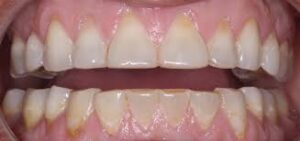
If you’re a regular reader of my write-ups, you’ve likely become familiar with my unique understanding of the issues surrounding TMJ disorders. As a neuromuscular dentist, I am able to intricately assess the individual structures of patients who display common symptoms associated with TMJ dysfunction.
To refresh you on temporomandibular joint (TMJ) disorder, it typically results when one’s bite alignment is “off.” When the upper teeth do not “rest” on the lower teeth properly, the disparity extends to connected structures. In addition to the jaw joints, this includes the craniofacial makeup primarily of tendons, muscles and nerves that are interconnected to the joints.
A neuromuscular dentist understands that it’s more than the alignment of the bite and jaw joints when assessing TMJ disorders. Having devoted over 300 hours of advanced training and incorporating some of the most advanced technology available, we pride ourselves on being the “go to” solution for people who have struggled with symptoms associated with TMJ disorders, including:
• Frequent headaches and/or migraines
• Sore jaw joints
• Sore facial or neck muscles
• Ear ringing
• Dizziness or vertigo
• Jaw popping
• Difficulty opening the mouth fully
Our advanced diagnostic technology can assess bite alignment, the congruity of teeth when speaking or eating, specific points of incorrect contact, and the position of the jaw joints.
Although the uncomfortable symptoms of a TMJ disorder are indications of its existence, the damage can go beyond discomfort. The health of your teeth can be highly vulnerable.
Many individuals who have TMJ issues clench or grind their teeth during sleep. This is a subconscious reaction of the jaws in their quest for a comfortable resting position.
Clenching can exert more force than many people realize. Some clenching can be forceful enough to crack a walnut. So, you can imagine that this could also damage teeth. When teeth endure this severe action night after night, teeth can become fractured or cracked.
A fracture or crack that occurs above the gum line can be repaired by crowning the tooth. However, a crack that extends below the gum line means the tooth will have to be removed. So you see, whether a tooth cracks above or below the gum line, the results can be costly.
Grinding teeth, also known as bruxing, means there is a combination of force PLUS a back-&-forth motion of upper teeth against lower. Over time, this can become apparent when the tops of teeth become flattened. We refer to this as worn teeth, since grinding can eventually wear them down in height.
When the teeth become so worn that there is risk of exposing the dentition, crowning is necessary to save the teeth. Crowning is also needed when grinding causes teeth to chip or break. This usually occurs when eating, even something soft. The tooth has become so damaged that a small disruption can cause the break or chip to give way.
As with a crack or fracture, when a tooth breaks off below the gum line, removal is required. This leaves a number of decisions for tooth replacement, and the associated costs.
For individuals who have “restorations,” these, too, are at risk for fracture, chips or becoming dislodged. Restorations include porcelain veneers, crowns, dental implant restorations, partials, and inlays or onlays.
Our goal is to assess each patient to determine if their bite alignment and/or jaw joints are the source of their symptoms. If so, the first step is to correct bite misalignment. In some cases, this can be done with the involvement of several teeth. In other situations, patients may require correction of a “full arch” of teeth (all upper or all lower).
In ALL situations, however, a mouth guard is absolutely necessary. These are custom designed to fit each individual comfortably and without bulk. The patient is able to sleep without feeling the “appliance” seems awkward or uncomfortable.
When teeth must be removed (or have already been lost), we can replace them through crown-&-bridge combinations or dental implants. Missing teeth, even those that are not visible in a smile, should be replaced to avoid the shifting of other teeth, which in turn can contribute to yet further bite misalignment.
You may wish to watch a brief video that includes my explanation of our care in TMJ disorders by tapping here.
If you suspect your jaw joints may be functioning less than harmoniously, it is important to have your bite and jaw joint function evaluated before damage occurs. It was Ben Franklin who is credited for saying, “A stitch in time saves nine,” which is especially good advice when it comes to your smile, your comfort, and your quality of sleep.
Call to learn more about our TMJ evaluation process: 586-739-2155. Or, tap here to request a free consultation. If you are in a location far from our Shelby Twp dental office, rest assured that we are experienced in treating people who come from far distances, including out of state. We will gladly structure your care to create an efficient treatment plan.